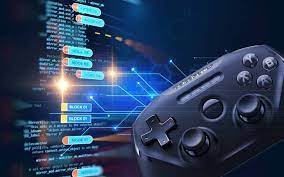The Rapid Evolution of the Gaming Industry through Blockchain Technology
The gaming industry has always been at the forefront of technological advancements, constantly pushing the boundaries of what is possible.

In recent years, one technology that has emerged as a significant catalyst for growth and innovation in gaming is blockchain. With its decentralized and transparent nature, blockchain technology is revolutionizing the gaming landscape, empowering players and developers alike. In this article, we will explore the ways in which blockchain is driving the rapid evolution of the gaming industry.
1. Immutable Ownership and Asset Interoperability:
One of the key advantages of blockchain in gaming is the concept of immutable ownership. Traditionally, in-game items, virtual currencies, and other digital assets were controlled and managed by game developers, leading to limitations on ownership and transferability. With blockchain, ownership of in-game assets can be securely established, recorded, and verified, allowing players to truly own their virtual possessions. This opens up a whole new world of possibilities, such as the ability to trade, sell, or lend assets across different games and platforms, thereby fostering a vibrant player-driven economy.
2. Enhanced Security and Anti-cheat Measures:
Blockchain technology brings enhanced security to the gaming industry. By leveraging decentralized networks and cryptographic algorithms, blockchain provides a transparent and tamper-proof infrastructure, making it extremely difficult for hackers to compromise game data or cheat. This ensures a fair and secure gaming environment, boosting player trust and confidence. Additionally, the use of smart contracts on the blockchain enables automated and transparent enforcement of game rules and regulations, minimizing the potential for fraudulent activities.
3. Tokenization and Reward Systems:
Blockchain enables the creation and utilization of native tokens, which can represent various in-game assets, currencies, or rewards. These tokens can be freely exchanged, facilitating seamless transactions within and outside of games. Furthermore, blockchain-based reward systems offer players the opportunity to earn tokens for their achievements and contributions, incentivizing active participation and skill development. These tokens can have real-world value and can be used for various purposes, including purchasing in-game items, participating in decentralized tournaments, or even exchanging for fiat currencies.
4. Decentralized Gaming Platforms and Communities:
Blockchain technology enables the development of decentralized gaming platforms, empowering developers and players to engage directly with each other, without intermediaries. These platforms leverage blockchain's transparency and smart contract capabilities to facilitate peer-to-peer interactions, enabling a more democratic and inclusive gaming ecosystem. Furthermore, blockchain-based communities can reward players for their valuable contributions, such as creating user-generated content, testing games, or providing feedback, fostering a sense of ownership and collaboration.
5. Play-to-Earn and Economic Empowerment:
The play-to-earn model, enabled by blockchain, has gained significant traction in the gaming industry. It allows players to monetize their gaming skills and time by earning valuable digital assets or tokens that can be converted into real-world value. This has the potential to empower individuals in regions with limited economic opportunities, creating avenues for income generation and financial independence through gaming. Blockchain-based gaming initiatives have already shown promise in providing livelihoods to players, particularly in developing countries.
Conclusion:
Blockchain technology is undeniably transforming the gaming industry, bringing about unprecedented levels of ownership, security, and economic empowerment. By enabling immutable ownership, asset interoperability, enhanced security, and decentralized platforms, blockchain is driving the evolution of gaming towards a more player-centric and inclusive landscape. As the technology continues to mature and gain mainstream adoption, we can expect even more innovative applications and opportunities to emerge, blurring the lines between virtual and real-world economies. The future of gaming is undoubtedly intertwined with blockchain technology, and its impact will continue to shape the industry in remarkable ways.
What's Your Reaction?





















